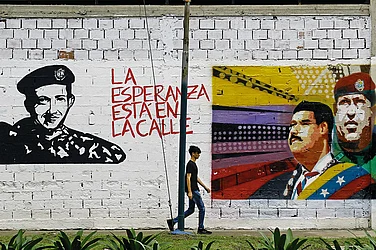Since the shelling began to intensify in Kyiv and Kharkiv about a week ago, Julia Entin has been working feverishly — thousands of miles away in Los Angeles — to evacuate Holocaust survivors in Ukraine who find themselves trapped in yet another conflict.
For the last six years, the 39-year-old paralegal at Beth Tzedek Legal Services has helped connect Holocaust survivors with local services. Now, Entin is coordinating rescue efforts in Ukraine because she "feels a personal connection" to their painful predicament.
“These are already survivors of severe trauma,” said Entin, a refugee from the former Soviet Union and granddaughter of a Ukrainian Holocaust survivor.
“And now with this war, they are experiencing that trauma all over again."
Entin is a strand in an intricate web of grassroots organisations — Jewish and non-Jewish — that has been spinning round the clock in Ukraine, working with taxi and bus operators to ferry members of vulnerable communities out of the war zone.
In a time of crisis when Jewish people from Ukraine are attempting to flee to Europe and Israel, groups such as the Jewish Federation of Los Angeles and partner organisations such as Entin's, have been helping families stateside who want loved ones extricated.
Entin said many have reached out to her directly because her work with Holocaust survivors.
Entin has been calling survivors in Ukraine, usually with a family member or friend on the line.
It can be challenging to establish quick rapport with older people — many with serious health issues — huddled in their homes during wartime. Entin starts out by apologising for speaking in Russian, instead of Ukrainian.
“I identify myself and tell them who I am — the granddaughter of a Holocaust survivor,” she said.
“I tell them how my grandfather was not evacuated and lived through (World War II) under Nazi occupation. It is a deep connection we have. And that helps build trust,” she added.
Entin still had trouble getting survivors to leave with trusted taxi or bus operators, who she said were vetted and recruited through referrals.
This week, one man in his late 80s refused to leave because he was afraid he might die on the way.
“Convincing him has been a real challenge because you cannot guarantee — no one can guarantee — that it won't happen,” she said.
But there have been a few success stories that have kept Entin hopeful.
On Sunday, 81-year-old Holocaust survivor Valery Semenovich Zharkovsky, his daughter Inna Valerievna Zharkovskaya, and her eight-year-old daughter were rescued from their home in Kharkiv.
Entin on Wednesday said the family arrived in Germany, where Zharkovsky's brother lives.
She said Jewish refugees typically choose to go to Israel — its Law of Return lets Jewish people make “aliyah” and acquire citizenship — or other parts of Europe where they could receive benefits, such as health care, right away.
“Regardless of where they choose to go, it has to be a warm handoff, which means someone will always be on the other side of the border to greet them and put them on the path to their destination,” Entin said.
Zharkovsky's cousin, Marina Sonina, who lives in the Chicago area, said she was relieved to hear her relatives made it out safely. She spoke with him last Saturday, a day before he left Ukraine.
“He was scared because the situation was really bad,” she said, choking up.
With attacks intensifying, volunteers have been arriving at the Polish border to assist evacuation efforts.
Liana Georgi, an artist, psychologist and LGBTQ activist, who splits her time between Berlin and Istanbul, is among a core group of volunteers with Safebow, a group formed by gender non-conforming actor and activist Rain Dove to conduct rescue operations.
The group has been communicating via WhatsApp and started “as a mental support group to give people the courage to flee,” Georgi said from Warsaw.
“It's about being there for each other, even if it's virtually.”
Safebow has partnered with Entin's organisation to evacuate Holocaust survivors, as well.
Georgi said the group was focusing on rescuing vulnerable minority groups, including those in the LGBTQ community, the disabled and people of colour.
The Jewish Federation of Greater Los Angeles and the Jewish Federation of North America have been involved in getting Jewish refugees from Ukraine to Israel, said Rabbi Noah Farkas, president and CEO of the former.
He said his organisation raised USD 1 million in four days, with the suffering in Ukraine resonating with members of other diaspora communities in Los Angeles.
“We've received donations from children and grandchildren of Holocaust survivors. We have a diverse community in Los Angeles — from Iran, Morocco and other Mizrahi communities.”
Jewish Federation of Los Angeles Vice President Aaron Goldberg, who is based near Jerusalem, has helped connect newly arrived refugees with much-needed services.
“Our goal is to support their immigration and integration into Israeli society,” Goldberg said.
Russian President Vladimir Putin has — in what experts call a cynical ploy — claimed he want to “de-Nazify” Ukraine led by Volodymyr Zelenskyy, a Jewish president whose relatives were killed in the Holocaust.
There are fears of renewed Jewish repression and some of Russia's remaining 2,50,000 Jews are also trying to flee to Israel — but the process has been more complicated because there are not nearly as many resources, Goldberg said.
“But, right now, we don't know how the sanctions could affect the Jewish community there,” he said.
The work of evacuating Holocaust survivors in Ukraine continues as bombings have escalated this week.
Entin on Tuesday said she was working to help three couples — all Holocaust survivors — struggling after a night of more shelling and devastation in Kharkiv.


























